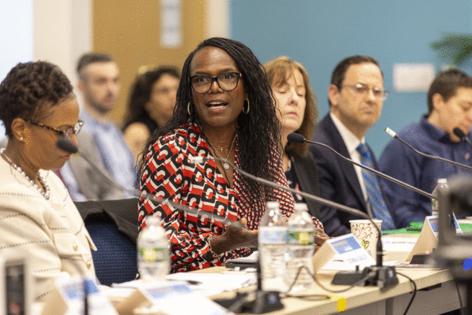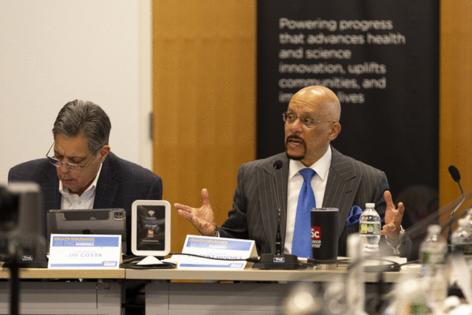In Philly, lawmakers, health systems are already worrying about potential cuts to Medicaid
Published in News & Features
PHILADELPHIA — The potential impact of looming Medicaid cuts would touch every corner of health care in Pennsylvania, which is already worrying more than two dozen lawmakers, health system administrators, and stakeholders who convened in Philadelphia Tuesday to discuss how to prepare.
As Republicans and President Donald Trump’s administration attempt to cut taxes while also curbing spending, Congress is considering budget proposals that could cut up to $880 billion over the next 10 years from Medicaid, the federal- and state-funded health insurance program for low-income individuals, children, and people with disabilities.
About three million Pennsylvania residents, including 1.3 million children, are covered by Medicaid. The program covers about a third of births and 59% of nursing home stays.
No federal budget deal has been approved, and details of what could be cut are still to come. But lawmakers and stakeholders are bracing for deep cuts to critical safety net programs, with widespread impact on working families, hospital systems, schools, and the health-care workforce.
“This is an ecosystem,” Val Arkoosh, secretary of the Pennsylvania Department of Human Services. “We are all in this together, no matter where you get your health care from.”
Arkoosh was among the participants in a two-hour, roundtable discussion about potential Medicaid cuts at the University City Science Center. The event was organized by Pennsylvania State Sen. Vincent Hughes, a Philadelphia Democrat.
The federal government contributes about $30 billion a year, on top of the $14 billion Pennsylvania spends on Medicaid. If even part of that federal funding is cut, Pennsylvania lawmakers will need to come up with the money to sustain programs, or make difficult decisions about cutting services.
Impacts to health-care providers
Cutting Medicaid funding would further strain health systems, nursing homes, and skilled nursing facilities already operating at slim margins, stakeholders said.
Medicaid, which pays less than private insurance, often does not cover the full cost of providing care to patients.
For instance, Medicaid payments for skilled nursing commonly cover about three-quarters of the cost of care, leaving facilities to absorb the remaining costs, said Garry Pezzano, CEO of LeadingAge PA, which represents long-term care providers. The organization’s member facilities have already had to cut back services and face significant staffing challenges.
“We in Pennsylvania are going to have to figure out how to fund an already stressed system,” Pezzano said.
Pennsylvania could lose 42,000 jobs due to the ripple effects of Medicaid cuts, according to a study by The Commonwealth Fund, a nonprofit that studies health-care issues.
Ali Kronley, a vice president for SEIU Healthcare Pennsylvania, said the union’s 25,000 workers in nursing facilities, home care, and hospitals are worried about their jobs. Medicaid provides about half of the funding for those workers, she said.
Concern for behavioral health services
Behavioral health services could also be at risk.
Medicaid helps fund behavioral health services at public schools, community health centers, and hospital systems.
These programs often cost more money to run than health systems earn in revenue from services that are critically needed and already in short supply, stakeholders said.
“We lose tens of millions of dollars in behavioral health services,” said Peter Grollman, senior vice president of external affairs at the Children’s Hospital of Philadelphia. “That might be a bad business decision, but we say it’s the right mission decision.”
About half of CHOP’s patients are covered by Medicaid.
CHOP has been circulating form letters to federal lawmakers that warn of how potential funding cuts to Medicaid and research would harm families, and asking staff and patient families to sign them in opposition.
_____
©2025 The Philadelphia Inquirer. Visit inquirer.com. Distributed by Tribune Content Agency, LLC.












Comments